七年级上>Module 6 A trip to the zoo>Unit 3 Language in use
文档属性
| 名称 | 七年级上>Module 6 A trip to the zoo>Unit 3 Language in use | 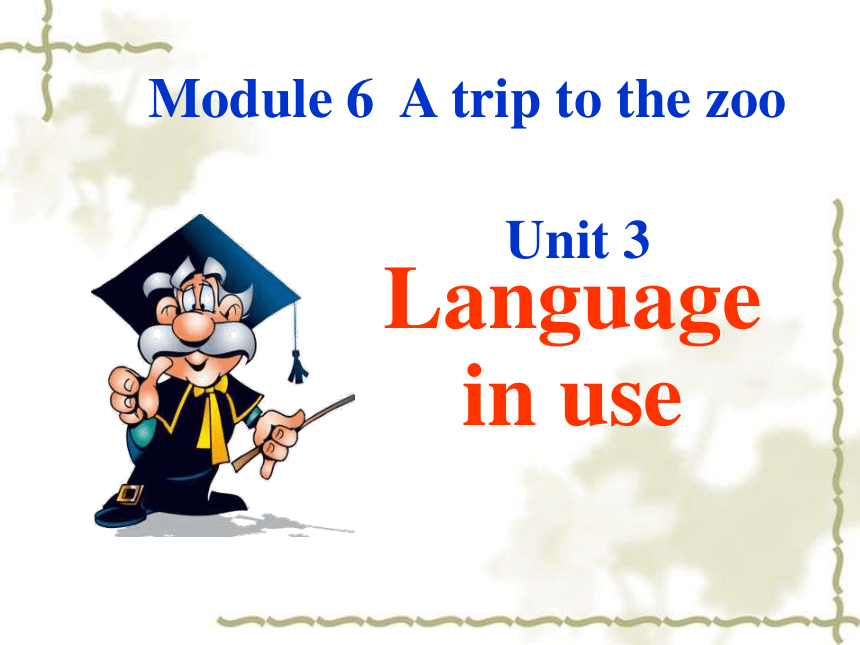 | |
| 格式 | zip | ||
| 文件大小 | 3.1MB | ||
| 资源类型 | 教案 | ||
| 版本资源 | 外研版 | ||
| 科目 | 英语 | ||
| 更新时间 | 2012-12-25 12:09:24 | ||
图片预览

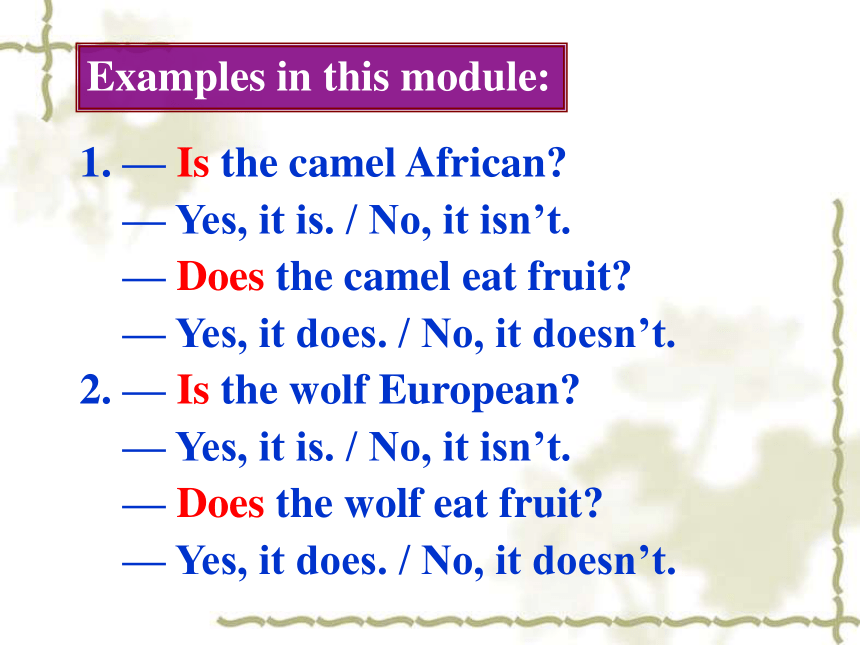


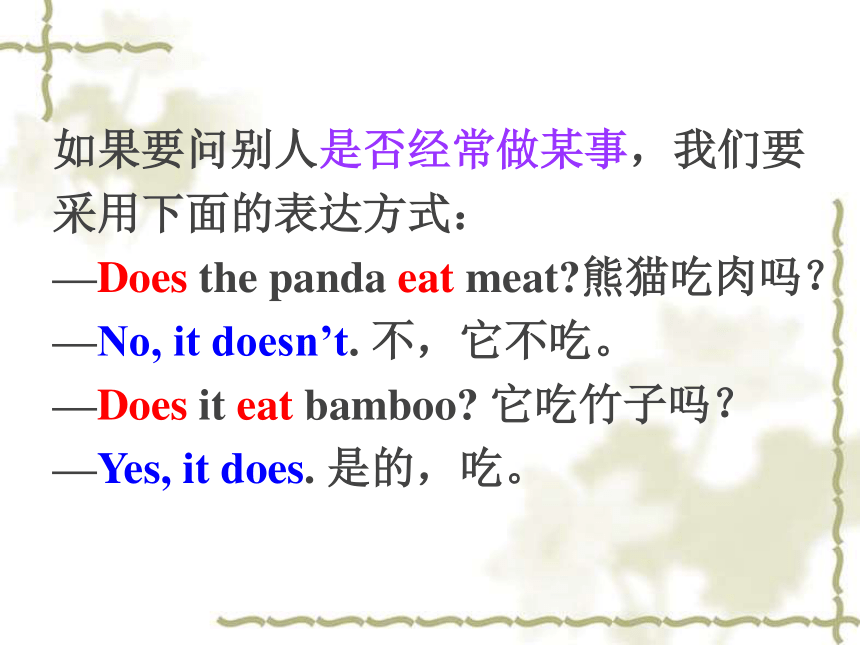
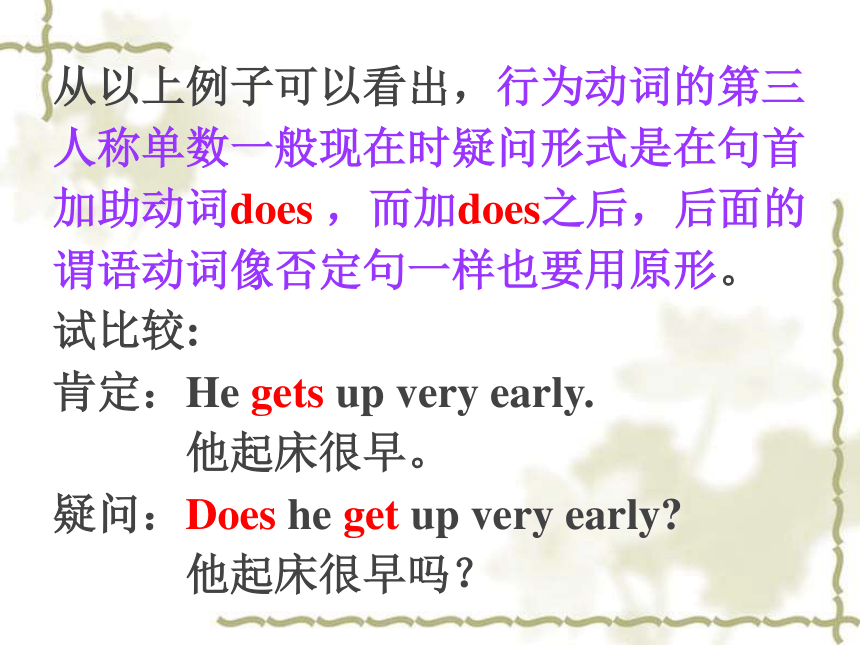

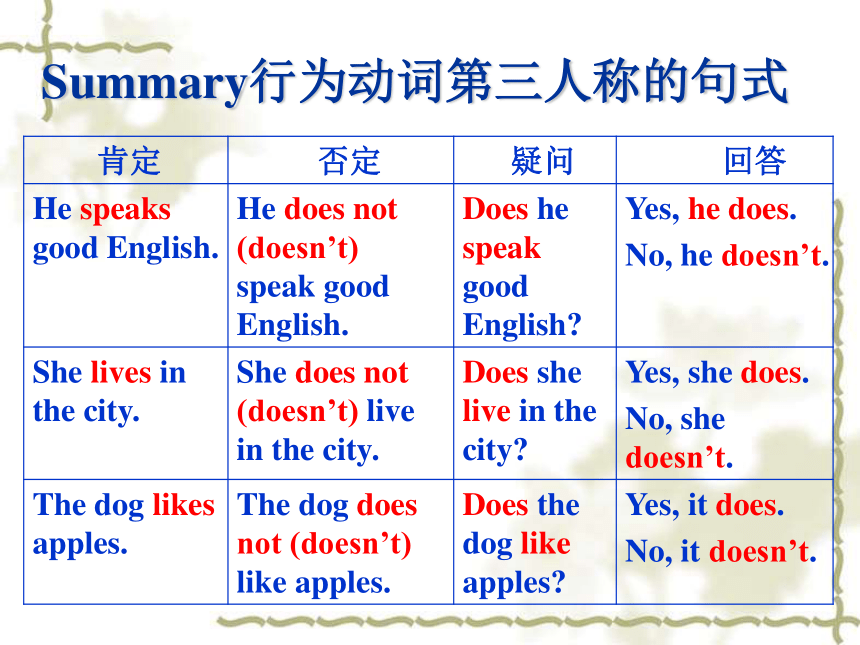

文档简介
课件24张PPT。Unit 3Language in useModule 6 A trip to the zooExamples in this module:1. — Is the camel African?
— Yes, it is. / No, it isn’t.
— Does the camel eat fruit?
— Yes, it does. / No, it doesn’t.
2. — Is the wolf European?
— Yes, it is. / No, it isn’t.
— Does the wolf eat fruit?
— Yes, it does. / No, it doesn’t.当主语是第三人称单数,表示经常性、
习惯性的行为时,我们这样表达:
She speaks English.
He lives far away from school.如果表示不常做某事,该怎样表达呢?她不说英语。
She doesn’t speak English.
他住地离学校不远。
He doesn’t live far away from school.一般现在时第三人称单数
作主语的疑问句及其回答你能总结出什么呢主语是第三人称单数的行为动词的一般
现在时否定形式是在行为动词前加
doesn’t (does not ),这时要注意把谓语动
词还原为动词原形。试比较肯定与否定
句中行为动词形式的变化:
肯定:He gets up very early.
他起床很早。
否定:He doesn’t get up very early.
他起床不很早。如果要问别人是否经常做某事,我们要 采用下面的表达方式:
—Does the panda eat meat?熊猫吃肉吗?
—No, it doesn’t. 不,它不吃。
—Does it eat bamboo? 它吃竹子吗?
—Yes, it does. 是的,吃。从以上例子可以看出,行为动词的第三
人称单数一般现在时疑问形式是在句首
加助动词does ,而加does之后,后面的
谓语动词像否定句一样也要用原形。
试比较:
肯定:He gets up very early.
他起床很早。
疑问:Does he get up very early?
他起床很早吗?肯定句:主语+动词的第三人称单数形式
否定句:主语+doesn’t +动词原形
疑问句:Does+主语+动词原形?
肯定回答:Yes, 主语+does.
否定回答:No, 主语+ doesn’t.现在把行为动词第三人称单数的各种
句式总结如下:ReviewSummary行为动词第三人称的句式Look at the pictures. Ask and answer. Work in pairs Name: Meimei From: Yuannan,
China
Favourite food: fruit— Does Meimei the elephant come
from Yuannan, China?
— Yes, it does.Name: Kingba
From: Asia
Favourite food: meat— Does Kingba the tiger come America?
— No, it doesn’t. It comes from Asia.
— What is Kingba’s favourite food?
— Meat.Complete the sentences with
does or doesn’t.
1. — _________ this panda come from
China?
— Yes, it ________.
2. — ________ this panda eat fish?
— No, it _______.DoesDoesdoesdoesn’t3. — _________ this monkey like fruit?
— Yes, it ______.
4. — ________ this monkey live in
Africa?
— No, it ________.
5. The zebra _________ like meat.DoesDoesdoesdoesn’tdoesn’tComplete the passage with the correct form of the words in the brackets.
My favourite animals (1) ____ ( be ) zebras. Look at this one ( 2). It ____ (be ) cute. It (3) _____ ( be ) black and white like the panda. But it (4) ________ ( do not ) come from Asia. It ( 5) ______ ( come ) from Africa. It ( 6) _______ ( eat ) grass.areisisdoesn’tcomeseatsThe world
of animalsAsiaAmericaEuropegiraffepandatigermonkeyelephantmonkeyAfrica zebraelephantmonkeyComplete the word mapAround the worldThe camel lives in the deserts of Africa and Asia and eats grass. Some people think it carries water in the humps on its back, but it’s not true. In fact, it’s fat.Camel The kangaroo is an Australian animal. It eats grass and leaves, but it doesn’t eat meat. It carries its babies in a pocket on the front of its body. With its strong tail and back legs, the kangaroo jumps across the grassland.KangaroosA. 用所给动词的适当形式填空:
1. He________ TV every evening. (watch)
2. We always _____ to school by bike. (go)
3. His uncle usually _____ to work. (walk)
4. I always ______ up at six in the
morning. (get)
5. John ______ like his father. (look)watchesgowalksgetlooksExercises B. 按要求改写下列句子:
1. He likes watching TV. (改为否定句)
________________________________.
2. She has lunch at twelve.(改为否定句)
________________________________.
3. Mike does his homework at six.
(改为否定句)
________________________________He doesn’t like watching TV She doesn’t have lunch at twelve. Mike doesn’t do his homework at six. 4. Jack likes Chinese food very much.(改
为一般疑问句,并作肯定回答)
__________________________________
___________________
5. He usually goes to school at 7:30. (改
为一般疑问句,并作否定回答)
_______________________________
___________________Does Jack like Chinese food very much? Yes, he does. Does he usually go to school at 7:30? No, he doesn’t. 1. My favourite animal is the elephant.
(对划线部分提问)
_____ _ your favourite animal?
2. Hand often goes to see his grandparents
on Saturdays.
(改为一般疑问句,并作否定回答)
____ Hand often __ to see his
grandparents on Saturdays?
No, he _______.C. 句型转换。What isDoes godoesn’t3. Our school has two thousand students.
(改为同义句)
_____ ___ two thousand students in
our school.
4. The panda is from China.
(改为同义句)
The panda ______ _____ China.
5. The tiger eats 5 kilos of meat a day.
(对划线部分提问)
____ _____ meat does the tiger eat a day?There arecomes fromHow muchReview the grammar we have learned today.Homework To preview the new words and
expressions in module 7 unit 1.PreviewThank you.
— Yes, it is. / No, it isn’t.
— Does the camel eat fruit?
— Yes, it does. / No, it doesn’t.
2. — Is the wolf European?
— Yes, it is. / No, it isn’t.
— Does the wolf eat fruit?
— Yes, it does. / No, it doesn’t.当主语是第三人称单数,表示经常性、
习惯性的行为时,我们这样表达:
She speaks English.
He lives far away from school.如果表示不常做某事,该怎样表达呢?她不说英语。
She doesn’t speak English.
他住地离学校不远。
He doesn’t live far away from school.一般现在时第三人称单数
作主语的疑问句及其回答你能总结出什么呢主语是第三人称单数的行为动词的一般
现在时否定形式是在行为动词前加
doesn’t (does not ),这时要注意把谓语动
词还原为动词原形。试比较肯定与否定
句中行为动词形式的变化:
肯定:He gets up very early.
他起床很早。
否定:He doesn’t get up very early.
他起床不很早。如果要问别人是否经常做某事,我们要 采用下面的表达方式:
—Does the panda eat meat?熊猫吃肉吗?
—No, it doesn’t. 不,它不吃。
—Does it eat bamboo? 它吃竹子吗?
—Yes, it does. 是的,吃。从以上例子可以看出,行为动词的第三
人称单数一般现在时疑问形式是在句首
加助动词does ,而加does之后,后面的
谓语动词像否定句一样也要用原形。
试比较:
肯定:He gets up very early.
他起床很早。
疑问:Does he get up very early?
他起床很早吗?肯定句:主语+动词的第三人称单数形式
否定句:主语+doesn’t +动词原形
疑问句:Does+主语+动词原形?
肯定回答:Yes, 主语+does.
否定回答:No, 主语+ doesn’t.现在把行为动词第三人称单数的各种
句式总结如下:ReviewSummary行为动词第三人称的句式Look at the pictures. Ask and answer. Work in pairs Name: Meimei From: Yuannan,
China
Favourite food: fruit— Does Meimei the elephant come
from Yuannan, China?
— Yes, it does.Name: Kingba
From: Asia
Favourite food: meat— Does Kingba the tiger come America?
— No, it doesn’t. It comes from Asia.
— What is Kingba’s favourite food?
— Meat.Complete the sentences with
does or doesn’t.
1. — _________ this panda come from
China?
— Yes, it ________.
2. — ________ this panda eat fish?
— No, it _______.DoesDoesdoesdoesn’t3. — _________ this monkey like fruit?
— Yes, it ______.
4. — ________ this monkey live in
Africa?
— No, it ________.
5. The zebra _________ like meat.DoesDoesdoesdoesn’tdoesn’tComplete the passage with the correct form of the words in the brackets.
My favourite animals (1) ____ ( be ) zebras. Look at this one ( 2). It ____ (be ) cute. It (3) _____ ( be ) black and white like the panda. But it (4) ________ ( do not ) come from Asia. It ( 5) ______ ( come ) from Africa. It ( 6) _______ ( eat ) grass.areisisdoesn’tcomeseatsThe world
of animalsAsiaAmericaEuropegiraffepandatigermonkeyelephantmonkeyAfrica zebraelephantmonkeyComplete the word mapAround the worldThe camel lives in the deserts of Africa and Asia and eats grass. Some people think it carries water in the humps on its back, but it’s not true. In fact, it’s fat.Camel The kangaroo is an Australian animal. It eats grass and leaves, but it doesn’t eat meat. It carries its babies in a pocket on the front of its body. With its strong tail and back legs, the kangaroo jumps across the grassland.KangaroosA. 用所给动词的适当形式填空:
1. He________ TV every evening. (watch)
2. We always _____ to school by bike. (go)
3. His uncle usually _____ to work. (walk)
4. I always ______ up at six in the
morning. (get)
5. John ______ like his father. (look)watchesgowalksgetlooksExercises B. 按要求改写下列句子:
1. He likes watching TV. (改为否定句)
________________________________.
2. She has lunch at twelve.(改为否定句)
________________________________.
3. Mike does his homework at six.
(改为否定句)
________________________________He doesn’t like watching TV She doesn’t have lunch at twelve. Mike doesn’t do his homework at six. 4. Jack likes Chinese food very much.(改
为一般疑问句,并作肯定回答)
__________________________________
___________________
5. He usually goes to school at 7:30. (改
为一般疑问句,并作否定回答)
_______________________________
___________________Does Jack like Chinese food very much? Yes, he does. Does he usually go to school at 7:30? No, he doesn’t. 1. My favourite animal is the elephant.
(对划线部分提问)
_____ _ your favourite animal?
2. Hand often goes to see his grandparents
on Saturdays.
(改为一般疑问句,并作否定回答)
____ Hand often __ to see his
grandparents on Saturdays?
No, he _______.C. 句型转换。What isDoes godoesn’t3. Our school has two thousand students.
(改为同义句)
_____ ___ two thousand students in
our school.
4. The panda is from China.
(改为同义句)
The panda ______ _____ China.
5. The tiger eats 5 kilos of meat a day.
(对划线部分提问)
____ _____ meat does the tiger eat a day?There arecomes fromHow muchReview the grammar we have learned today.Homework To preview the new words and
expressions in module 7 unit 1.PreviewThank you.
同课章节目录
- Starte
- Module 1 My teacher and my friends
- Module 2 My English lesson
- Module 3 My English book
- Module 4 My everyday life
- Module 1 My classmates
- Unit 1 Nice to meet you.
- Unit 2 I'm Wang Lingling and I'm thirteen years ol
- Unit 3 Language in use.
- Module 2 My family
- Unit 1 Is this your mum?
- Unit 2 These are my parents.
- Unit 3 Language in use.
- Module 3 My school
- Unit 1 There are thirty students in my class.
- Unit 2 The library is on the left of the playgroun
- Unit 3 Language in use.
- Module 4 Healthy food
- Unit 1 We've got lots of apples.
- Unit 2 Is your food and drink healthy?
- Unit 3 Language in use.
- Module 5 My school day
- Unit 1 I love history.
- Unit 2 We start work at nine o'clock.
- Unit 3 Language in use.
- Revision module A
- Module 6 A trip to the zoo
- Unit 1 Does it eat meat?
- Unit 2 The tiger lives in Asia.
- Unit 3 Language in use.
- Module 7 Computers
- Unit 1 How do I write my homework on the computer?
- Unit 2 When do you use a computer?
- Unit 3 Language in use.
- Module 8 Choosing presents
- Unit 1 I always like birthday parties.
- Unit 2 She often goes to concerts.
- Unit 3 Language in use.
- Module 9 People and places
- Unit 1 We're enjoying the school trip a lot.
- Unit 2 They're waiting for buses or trains.
- Unit 3 Language in use.
- Module 10 Spring Festival
- Unit 1 Are you getting ready for Spring Festival?
- Unit 2 My mother's cleaning our houses and sweepin
- Unit 3 Language in use.
- Revision module B
